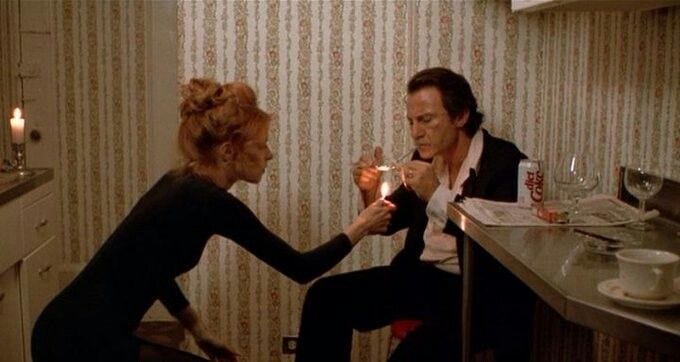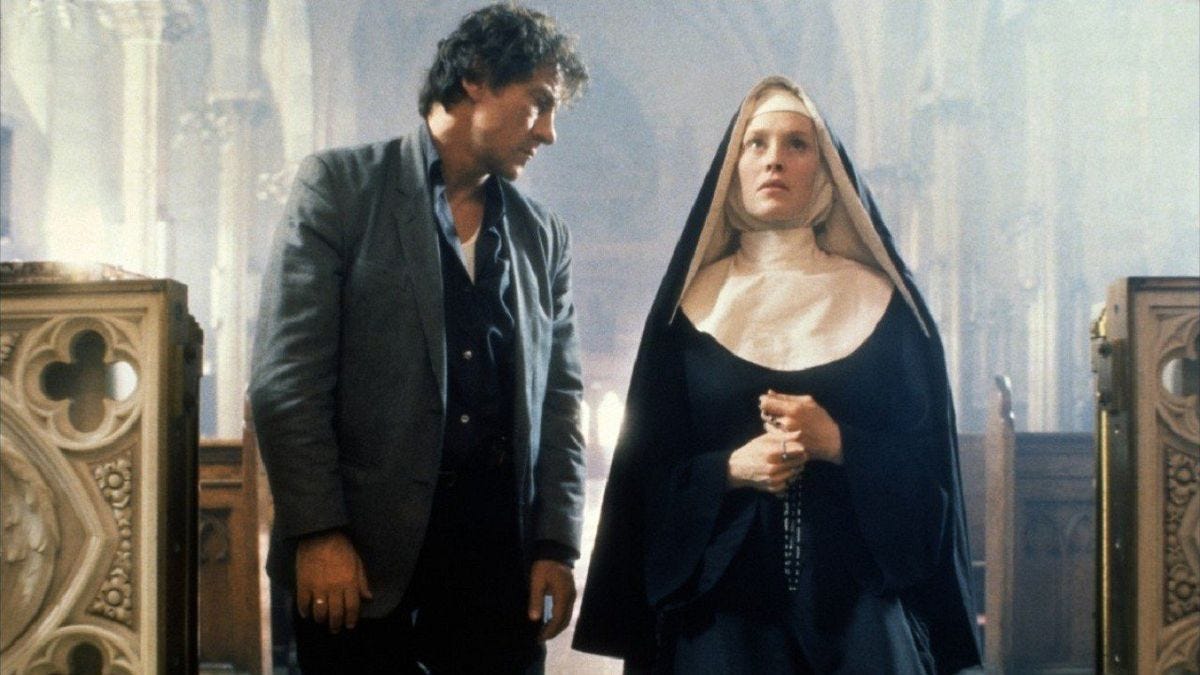Anniversaries: ’Bad Lieutenant’ at 30
Abel Ferrara’s instantly controversial 1992 film looks as upsetting and challenging as ever.
Anne Thompson: So you see this as a moral film?
Harvey Keitel: I see it as a myth. We’re deeply in need of our own myths. One has just to look at the chaos around us to know that we have lost our awareness of what a hero is. We need to create our myths—and read the old ones.
— Chicago Tribune, January 23, 1993
It’s not clear, in the exchange above, if Harvey Keitel is attempting to dodge the question. He’s discussing Bad Lieutenant, the Abel Ferrara film that premiered at Cannes in the spring of 1992 before making its American theatrical debut thirty years ago this week. It’s a film filled with scenes of drug use, sexual assault, acts of sacrilege, and flashes of graphic violence. It’s also, unmistakably, one obsessed with the concept of morality itself. It offers a vision of a fallen man in a fallen world who, after years of thinking that nothing mattered, has to confront the terrifying notion that maybe it all matters, that being human comes with obligations to those around him and to a God whose silence shouldn’t be mistaken for absence.
Bad Lieutenant is almost medieval in its fixation on morality, but also shocking in the generosity of its vision of redemption being available to all, from those who’ve devoted their lives to God to the lowest of the low — even those destroying themselves as they race toward death. In that sense, the unnamed NYPD lieutenant Keitel plays in the film is a kind of mythic figure, a man intent on plunging into an underworld that’s all too happy to welcome him.
Bad Lieutenant sometimes plays like the third act of a movie that’s been stretched to feature length. (Albeit a short feature; it runs a tight 96 minutes.) We learn virtually nothing about who the lieutenant was before the film began. When we first meet him, he’s already bottomed out or, at best, hovering a few inches above the bottom. He’s a family man with a nice little home, but all this starts to look like a cover for his true self the moment he steps away. He puts in time poking around crime scenes and jawing with other cops, but even this bleeds into the vice-ridden life that takes up most of his time when the talk turns into the bets they want him to make for them with his underworld connections. The Mets are playing the Dodgers in the NLCS. Who wouldn’t want a piece of that action?
The lieutenant grabs more than a piece. Though in the black when the film opens, he soon finds himself deep in debt to men he’s told will blow up his house with his family inside — cop or no cop — by betting against the home team. New York sports radio personality Chris “Mad Dog” Russo provides a running commentary on the action and as a kind of unknowing antagonist to the lieutenant as luck refuses to go his way.
It’s probably no coincidence that former Met Darryl Strawberry ends up playing a similarly accidental antagonistic role, his bat failing at crucial moments and coming to life only when it’s too late for the Dodgers to pull out a victory. An extraordinarily gifted slugger, Strawberry’s career was frequently interrupted by his struggles with addiction, but the lieutenant’s habits make even Strawberry’s consumption look minor league by comparison. He freebases cocaine then guzzles vodka to take the edge off while partying with two women, if “partying” is the right word for an apparently sexless encounter that ends with the lieutenant striking a Christ-like pose while nude and emitting pre-verbal squawks of distress.
Released at an early-’90s moment when it seemed almost impossible to avoid seeing Keitel’s penis, that scene became one of Bad Lieutenant’s most talked about (it’s even on the poster), but it didn’t lack competition. In one excruciatingly long scene, the lieutenant sexually humiliates a pair of teenage girls who’ve taken their father’s car without permission. In another, he shoots up with a woman credited as “Zoë,” played by Zoë Lund, star of Ms. 45 and, with Ferrara, the film’s co-screenwriter. “Vampires are lucky,” Zoë tells him as she makes preparations for them to shoot up. “They can feed on others. We gotta eat away at ourselves.” Ferrara lets the camera linger on the needle as first she injects herself then the lieutenant. They used saline solution for the camera, but Lund brought a comfort with needles to the film. She didn’t make it out of the decade alive, dying as a result of drug use at the age of 37 in 1999.
It’s hard to call the lieutenant’s trajectory spiraling. It’s a straight shot down, or would be without a significant digression along the way when he begins investigating the brutal rape of a nun (Frankie Thorn). It should be an easy case to crack. The nun knows the attackers. But she won’t name them because she’s forgiven them.
This extraordinary, seemingly impossible act of forgiveness shakes him, forcing him to consider his own failings and the many ways he’s fallen short of what’s right. “I try to do the right thing but I’m weak,” he tells a vision of Jesus (Paul Hipp) that can return his gaze but offer no further guidance. It’s up to us to fumble through with what we’ve already been told. It’s an encounter piercing in its clarity but fuzzy in its messaging. The lieutenant ends the film trying to do the right thing and follow the nun’s example, but is his extraordinary gesture inspired or misguided? Bad Lieutenant is ultimately a film about being lost, seeing the light, and then struggling to know how to follow it.
“You don’t make up for your sins in church. You do in the streets,” goes one famous line from Mean Streets, and Bad Lieutenant is in many respects a film in conversation with that movie, among others. (Bergman comes immediately to mind.) It not only shares a star with Mean Streets but twice plays a song central to Scorsese’s breakthrough movie, “Pledging My Love” by Johnny Ace, a tender ballad performed by a doomed star. Bad Lieutenant’s final scene recalls the Mean Streets finale, too, only this time Keitel never makes it out of the car. There’s another Scorsese, echo, too. As Judas in The Last Temptation of Christ, Keitel had already played a character who spoke to, and fell short of, Jesus. But Ferrara isn’t anyone’s imitator. Scorsese created an elaborate tracking shot to follow his protagonist into the Copacabana; Bad Lieutenant films its protagonist’s journey through a downtown club guerrilla style, complete with unwitting extras occasionally looking at the camera. The geographic and thematic territory might be similar but the tour guides bear little resemblance to one another.
Bad Lieutenant was made with the understanding that it would not be for everyone, in both the figurative and literal sense. Ferrara not only negotiated that he would have the final cut but that it would be rated NC-17. This was the tail end of the moment when the NC-17 rating seemed like it could do the job it was created to do: carve out a space for non-pornographic films with content beyond the bounds of the R rating. It’s a space practically made for Ferrara, who didn’t graduate from grindhouses to arthouses so much as blur the line between those worlds with films like Ms. 45 and King of New York that made vibrant, haunting art from pulpy premises.
Between the time Ferrara shot the film in the fall of 1991 and its debut the following year, that space essentially disappeared. There’s no single culprit, but the spring 1992 release of Basic Instinct — a film trimmed to touch the absolute limits of what an R-rated film can contain in order to skirt earning an NC-17 — now looks like the end of the line for NC-17’s viability. (Its director, Paul Verhoeven, would himself test the waters a few years later with the NC-17-rated Showgirls, a flop that owed its second life to home video.)
It’s a film that needs a proper warning for those who want to avoid its extremes, but also one that wouldn’t work without them. An R-rated cut was made available through Blockbuster or Hollywood Video, whose joint refusal to stock NC-17 films helped kill the rating. I’ve never seen it, but I can only imagine a softer version of Bad Lieutenant would have to be a lesser version and, by looking away from the awfulness rather than make us marinate in it, a less moral one as well.







A couple of things:
1) I don't mention BAD LIEUTENANT: PORT OF CALL NEW ORLEANS above because it's kind of irrelevant to Ferrara's movie (and he doesn't approve of it). But it rules in its own right and I've written about it extensively elsewhere. (Still in stores and available online: AGE OF CAGE: https://us.macmillan.com/books/9781250773036/ageofcage
2) Came across this look at BAD LIEUTENANT's MPAA submission in the course of researching this: https://www.somethingawful.com/news/bad-lieutenant-movie/1/
As a PSA, when I tried to correct my BL bindspot either this past year or the year before, I watched it on iTunes and it turned out to be the censored R-version.
I *think* that was the case with Amazon as well (I'd have to double-check)
Apparently it's the same with HBO Max.
https://www.cheatsheet.com/entertainment/bad-lieutenant-edited-hbo-max.html/
(I think the censored version is 6 minutes shorter, I'd also have to double-check that).
If you get the Lionsgate Blu-ray, it's the uncensored version. Hooray for physical media, I guess.